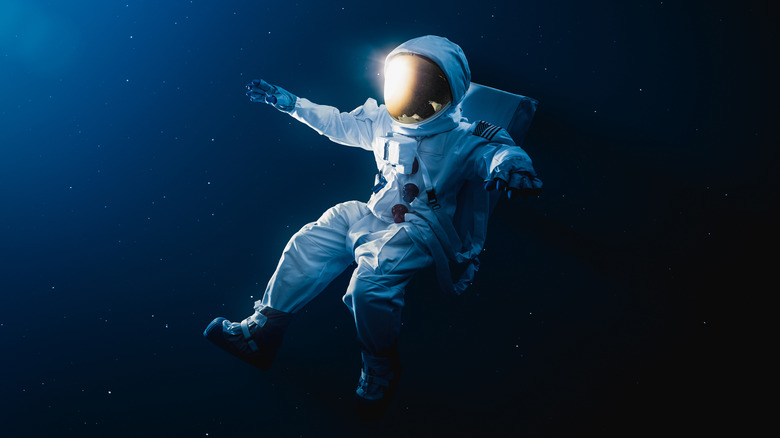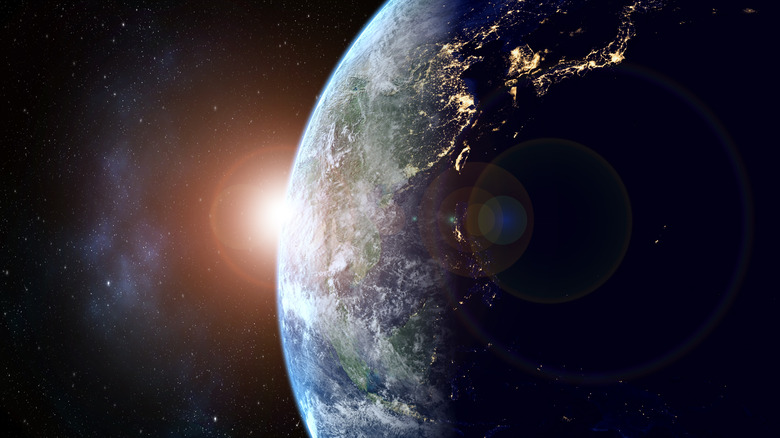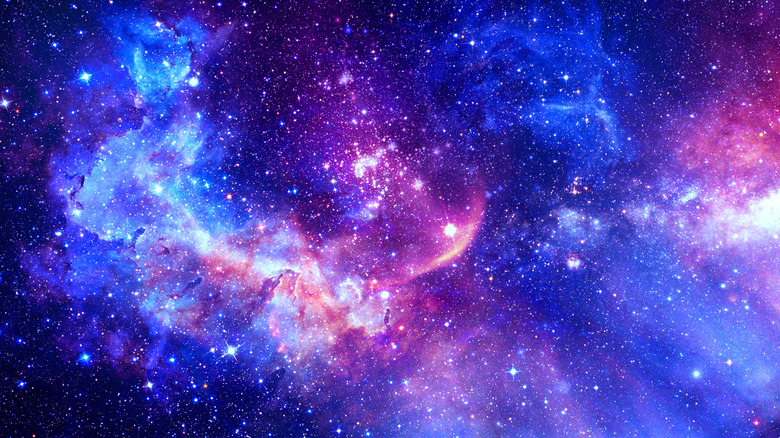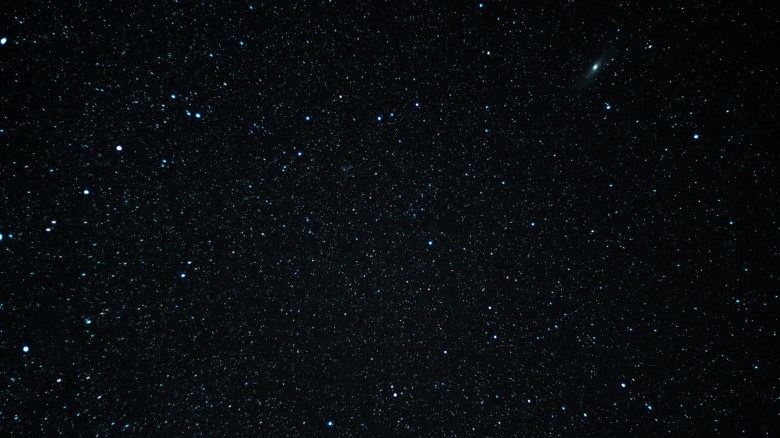Here's What Would Happen If There Was No Gravity
Admit it: At some point, you've wondered about what the world would be like if humans weren't naturally grounded. Unlike many birds and insects, man wasn't born with the biological ability to defy gravity, the force that literally keeps our feet on the ground.
According to Live Science, gravity completes the quartet of the universe's four fundamental forces, together with strong nuclear forces, weak nuclear forces, and electromagnetism. Gravity is the force of attraction between two given objects. Everything in the universe that has mass — whether it's a coral reef, a spider, or a popular parody singer – attracts every other object with mass (via Universe Today). The strength of that attraction depends on how massive the objects are and how close or distant they are from each other. When people hear about gravity, planets usually come to mind, which is why it can be difficult to picture how it works on a smaller scale. That's probably also why this critical requirement for existence tends to get ignored.
But what if gravity stopped working one day? What if it disappeared, even for just ten seconds? Take note that based on physics, a scenario that suddenly eliminates gravity from Earth is impossible — which is extremely fortunate, because if that were to happen, these terrible, terrible things would certainly follow.
You would lose muscle mass and bone strength
Truth be told, so many things would simultaneously go wrong if gravity suddenly went kaput. Thus, it's best to focus on the small, easy stuff first. Namely, your own body.
Astronauts have had extensive experience when it comes to living in an environment with no gravity. Nature defines zero gravity as "a state of weightlessness," which is what happens when a spacecraft's acceleration counterbalances (and effectively cancels out) Earth's gravity. On paper, this sounds fun — but in practice for long periods of time, it's dangerous and even lethal to human health. Because all human beings are born on Earth, an environment perpetually under the influence of gravity, the body's development is greatly affected by gravity's constant downward pull. That means it's under constant stress, and our muscles and bones develop specifically to withstand that stress. Take away gravity for an extended period of time, and that mechanical strain goes away. As a result, the body forms fewer osteoblasts (bone-building cells), leading to a loss of bone mass and greater susceptibility to fractures.
Another nasty side effect: As the calcium normally stored in your skeleton gets released into your bloodstream, you'll suffer renal stones, bowel movement problems, and more (via Wired). And as the What If Show explains, studies have shown that astronauts in space experience significant losses in both bone strength (14 percent after six months of being on a space station) and muscle mass (up to 20 percent in just 5-11 days).
Your sense of balance would be thrown out of whack
Fun fact: Humans have more than five senses. One of the most important ones — and one that we tend to take for granted — is our vestibular sense, which is what helps us tell up from down and prevents us from falling over. This internal sense of balance is what allows people to ride bikes, walk along a straight line, stand on one foot, or move their heads and limbs without getting disoriented.
Nature explains that all of this is made possible by the intricate system in every person's inner ear that keeps track of the body's movement, the different directions and how they relate to the person's current position, and other aspects that play a role in making sure the person doesn't become a disoriented, headache-plagued heap on the ground. And as you've probably guessed by now, gravity has a lot to do with it.
Admittedly, the balance-setting organs in the ear (the otoliths and semicircular canals) technically aren't necessary for a human being to survive. However, taking them away would bring tremendous suffering. Or, as Wired succinctly puts it: "Imagine a gently oscillating, nausea-inducing scene from which there is no escape. That's what it feels like when the organs of the inner ear malfunction."
Your red blood cell count would fall
According to the What If Show, a human heart pumps approximately 2,000 gallons of blood on a daily basis. This organ's critical role in keeping you alive is possible only because of gravity: As your body has gotten used to living on Earth for pretty much your entire life, the amount of effort your heart exerts takes gravitational force into consideration. Suddenly removing gravity from the equation would cut off blood from vital parts of your body, including your extremities and your digestive system.
Nature explains that sudden disappearance would also drastically affect your blood pressure. Normally, the brain bears about 60 to 80 mm Hg (millimeters of mercury) worth of pressure, while the feet, which bear your entire body weight, reaches up to 200 mm Hg. This ideal balance in our blood pressure is possible to maintain because gravity keeps it that way.
Here's what would happen if gravity suddenly disappeared: Your blood pressure would become about 100 mg Hg across your body, and its effects would quickly manifest: Your face would swell with fluid as your legs get drained, your eyesight would be tremendously diminished, your blood vessels would rupture, and you might even suffer a stroke that could leave you with permanent brain damage. Per Wired, your red blood cell count would fall. A low red blood count, generally known as anemia, leads to possible oxygen deficiency, a longer recovery time for injuries, and a severely compromised immune system (via Medical News Today).
You wouldn't be able to sleep well
Despite the endless hours scientists have devoted to studying it, there's still no conclusive answer as to exactly why humans need sleep to survive. What experts do know, however, is that gravity has a strong connection to sleep patterns and the quality of sleep a person gets — and without it, both of those would be greatly impaired.
As The Conversation reports, astronauts rarely get some decent shuteye when they're off-world. This is especially the case during long-term spaceflight, in which the astronauts are subjected to a long period of low gravity. Even the seemingly simple act of lying down becomes a Herculean feat for them because, well, how exactly do you lie down in a setting where there is no "up" or "down?" Their internal clocks, which affect their sleeping patterns, are thrown into disarray. Plus, because there's no gravity to hold them down while they try to sleep, tightly secured sleeping bags are a must.
Additionally, even if you manage to fall asleep, it's unlikely that you'll get enough. A 2018 study concluded that since gravity affects the human body during a person's waking hours, it is partly responsible for sleep. The study also affirmed that gravity conditions Rapid Eye Movement (REM) sleep, aka the part when you dream. According to Biology Online, this is only achievable when a body is lying down properly. (Interestingly, this is true not just for humans but for horses and elephants, too.)
Nothing would stay in place on Earth
Perhaps the most obvious effect of the sudden disappearance of gravity is that nothing would stay in place. You might even be picturing it as everything gently drifting off into the sky, as if fairies had sprinkled pixie dust all over the planet, or something. However, the reality of what would happen is far from the scenario you're probably imagining: It's a lot more chaotic, somewhat comical, and unexpectedly violent.
As HowStuffWorks explains, gravity is the reason why your car, the stuff inside your office, and even your parents and siblings manage to stay on the ground. Keep in mind, however, that Earth is in constant motion. According to Karen Masters' "Ask an Astronomer" column on the Cornell Astronomy website, a person standing at the Earth's equator would actually be moving at a speed of more than 1,000 miles per hour. Ever notice how when a car suddenly accelerates, everything inside it that's not properly secured gets jarred out of place, in all sorts of crazy directions? In a sense, making gravity disappear would be like suddenly removing all the seatbelts that keep things on the planet from rolling around.
Long story short, everything that's not firmly rooted on the ground — whether it's a person, a desk, or a car — would turn into "fast-moving tumbleweeds," as Science ABC describes. Not even houses and buildings would be safe; they, too, would end up becoming gigantic tumbleweeds of destruction.
Everything that's not bolted down would float off into space
Of course, once everything starts rolling around after gravity gets turned off, they won't stay on Earth for very long. As the planet rotates, every rolling object you can imagine will start to float into space, no matter how large they are (via HowStuffWorks).
Think being inside a big building (such as your office or the mall) would save you from this fate? Think again. As this chaotic mess plays out, you'll find yourself rolling and then floating towards the ceiling. If you somehow manage to survive this (not to mention the deluge of heavy equipment, appliances, and furniture unceremoniously flying your way), you'll notice that the entire structure will be drifting away much faster over time. As Cornell Astronomy details, it (as well as everything else outside) would be floating away in a straight line at an accelerated pace, as it deviates from the planet's spinning path.
Oh, and if you think that only the things that are on Earth would be affected by all of this, you'd be incredibly wrong. It's the pull of their respective planets that keep satellites in orbit. In other words, when Earth's gravity says bye-bye, so will the Moon (via Futurism). With nothing to keep the planet's sole satellite spinning around it, the Moon will drift off into parts unknown.
Earth would lose all its bodies of water
When it comes to discussing the effects of Earth's gravity suddenly disappearing, the phrase "everything on Earth" literally means "everything on Earth." This includes the things that are so big that we don't normally think of them as "things" but "places."
As HowStuffWorks explains, the oceans, lakes, and rivers on Earth stay on our planet because of gravity. Erase that from the picture, and there would be nothing to keep those all-important bodies of water firmly on Earth's soil. It would most likely be a terrifying sight: humongous water formations rising up, making their way to space as if someone had put rocket boosters on translucent blue continents. As they drift away, they'll likely break apart, forming smaller bodies of water that keep breaking apart as they move along (via the What If Show).
At some point, you'll notice whales, dolphins, sharks, octopuses, and all sorts of marine life flying away, against their will, encased in their bead-like hydro-prisons. All of this may initially be fun to look at ... until you notice the poor creatures dying due to shock, drastic temperature and pressure changes, and the other nasty side effects of their unexpected flights.
The atmosphere would literally leave Earth
Now, you might not consider the Earth's atmosphere as an object that would be affected by gravity's loss. For the purpose of this discussion, however, it absolutely counts, which is important, because this is where things go from worse to truly horrific.
Just like the Earth's many bodies of water, gravity is the only thing that's keeping the atmosphere, well, the atmosphere. In fact, the Moon's comparatively weak gravitational pull is why its extremely thin atmosphere is quite different from Earth's (via Forbes). According to the What If Show, as every object on the planet starts to tumble around, the molecules in the atmosphere would immediately begin to drift off into outer space. This, of course, includes oxygen, which not only keeps most living organisms alive.
If that doesn't already sound horrifying enough to you, Science ABC adds that with Earth's atmosphere disappearing, the air pressure would change quickly and significantly. If you've ever been on an airplane, you've probably experienced the ear-popping sensation that happens as your plane ascends. Now take that, but make it about a couple hundred times worse.
Earth would break apart into chunks
It's important to stress that the chances of this nightmarish no-gravity scenario ever happening on Earth sit somewhere between zero and none. That's because, as HowStuffWorks explains, the only way to change the planet's gravity would be to change the planet's mass. Since Earth's mass is constant, and there's nothing taking ginormous pieces away from the planet right now, there's no danger of that happening, according to Futurism (barring any crazy cosmic-scale shenanigans straight out of science fiction, of course). That's a relief, because if Earth's gravity ever disappeared, the planet itself would cease to exist the way it has for billions of years.
Gravity is basically what holds this planet together. It's the glue that keeps the Earth's layers – the inner core, outer core, mantle, and crust — intact as it rotates on its axis and revolves around the Sun. Take that glue away, and ... well, HowStuffWorks describes it best: "If Earth's gravity became zero, nothing would hold it and chances are that its inner core would eventually burst in a lethal titanic explosion due to intense pressure. Earth would break into pieces that would float around space, wreaking havoc."
...And so would the Sun and other stars
According to NASA, the Sun is so huge that more than a million Earths could fit in it. Due to its sheer size and massive gravitational force, this star, which sits at the center of the solar system, manages to keep Earth and other planets following specific orbits. And like our home planet, gravity is what keeps the Sun's burning-hot gases in its ball-like form. This is also the case for other stars. As for black holes, they're unbelievably massive, so much that even light is no match for their gravitational pull (via NASA).
If you were to expand this thought experiment and remove gravity not just from Earth but from the Sun and other celestial bodies, the results certainly wouldn't be pretty. As the BBC puts it: "Without the force of gravity to hold [the Sun] together, the intense pressures at its core would cause it to burst open in a titanic explosion. The same thing would happen to all the other stars in the Universe." Take note, though, that due to how distant the other stars are from Earth, it's unlikely that any Earthlings would be around to witness the celestial light show.
The universe would become just a soup of atoms
What if this thought experiment were to escalate further? What if there were no gravity not just on Earth, not just on any other celestial body, but throughout the universe? Simply put, there would be nothing to see, distinguish, or appreciate. The entire universe would be, as Futurism describes, "completely flat and featureless."
Imagine that you could somehow step outside the universe, viewing it from outside its boundaries (perhaps through a pair of multiversal binoculars in an alternate reality). You would be looking at an empty, boring void. Because it's gravity that makes it possible for planets, stars, and black holes to exist, there would be nothing to admire in this sad, empty version of the universe. And because there are no planets for any life-forms to live on, life as you know it would not be possible in this gravity-free expanse.
You'd die an uncomfortable death — faster than you think
To get a proper grasp of how bad things could get if there were no gravity, each of its effects have to be discussed separately. However, if this unlikely situation ever came to pass on Earth, everything awful that would happen would occur simultaneously: Your body would malfunction, various objects would start tumbling and flying into outer space, the oceans and atmosphere would float away from the planet, and the planet itself would crumble like a cookie smashed with a hammer, all at the same time. Plus, the Moon's departure would likely cause some serious seismic activity while all of these things are happening, according to Seeker. It would be a miracle if anyone could survive these horrors for five minutes, especially since no one would be able to run, much less move. Oh, and you'd probably die sopping wet and drenched in your own sweat, because those beads of perspiration would pool all over your skin (via the What If Show).
There's still a lot that scientists don't completely understand about gravity, even though it's already clear that this force is critical for life on Earth to continue. Plants seem to be especially dependent on it, New Scientist states, based on experiments conducted both on Earth and in space. It's entertaining to ask, "What if there were no gravity on Earth?" — but it's truly fortunate that no one will ever know the answer through firsthand experience.












